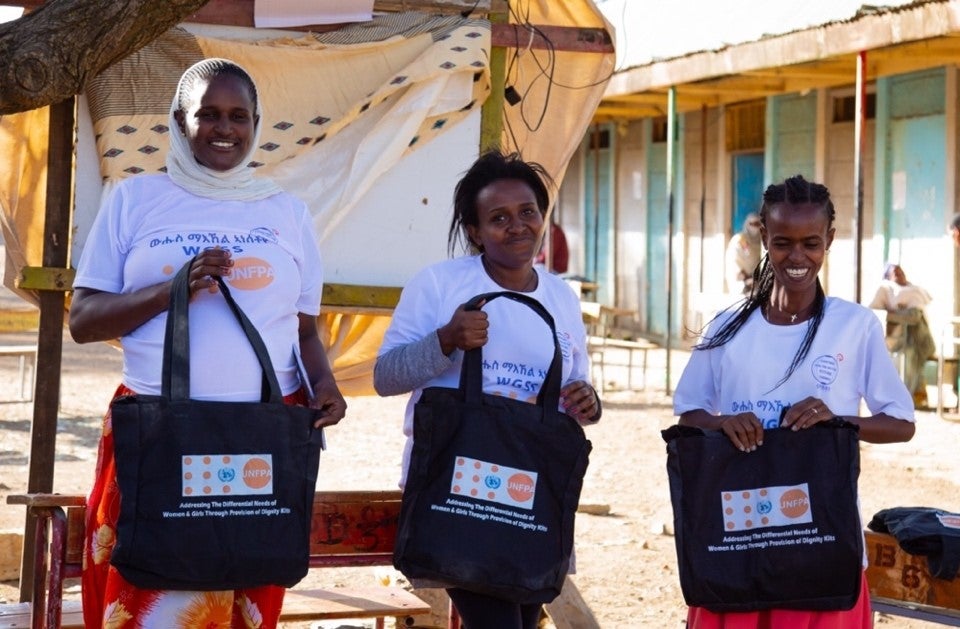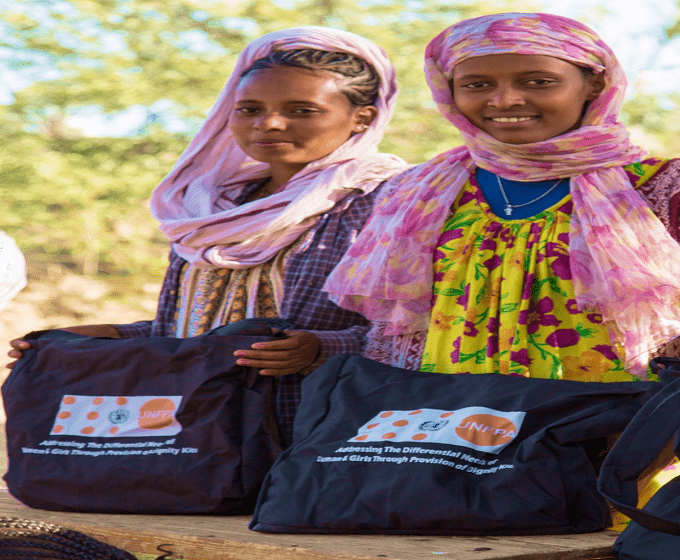Tigray, Ethiopia - “When I fled my village due to the bombings, I did not have a chance to pack any of my clothes or other belongings. I was so afraid and desperate to find safety for me and my children. I had to leave my home and business behind and run to Mekele” said Tesha*, 27 years old, mother of two children who stays at one of the camps in Mekele, Tigray for displaced people.
During conflict, women and girls are forced to leave their homes with only the clothes on their backs. Overwhelmed by financial constraints, they often struggle to obtain essential materials, including soap, menstrual hygiene supplies, and basic clothing items, which are needed to maintain their personal health and dignity. “I have no income, nothing. Most of the days, I struggle with meeting the most basic needs of my children, like daily food. When you don’t have the means to change clothes or you don’t have money to even buy soap, something as natural as one’s menstrual period becomes a real challenge.”
The conflict in Tigray region, Ethiopia, since early November, has resulted in the displacement of more than 1.1 million people. 4.5 million are estimated to be in need of humanitarian aid due to the conflict and natural disasters impacting the Northern part of the country. Among those IDPs, women and girls experience heightened vulnerabilities and are in dire need of specific support and protection in response to the ever-changing humanitarian crisis. Since the onset of conflict, UNFPA has played a critical role in providing comprehensive GBV care, including mental health and psychosocial support and life-saving sexual and reproductive services and supplies for women and girls, through One-Stop Centers and Safe Spaces. “Most of us will never have to face the deep insecurity of being forced from our homes – the root of our family life and sense of stability. Add to that the humiliation of not having access to basic hygiene items, like soap for bathing and laundry. We want women and adolescent girls to know that they are not alone, and that their security matters. The whole person matters…from the head to the toe…from medical services to women and girl socialization, to mental health counseling and having a safe and private space. UNFPA wants no one left behind” remarks Diana Garde, UNFPA Humanitarian Coordinator in Tigray, Ethiopia.
Despite the many challenges with humanitarian access faced during the last months, UNFPA has distributed through strategic partnerships more than 20,970 dignity kits across displaced sites located in Tigray, Afar and Amhara regions. Each kit contains basic hygiene supplies such as soap, detergent bars, and menstrual hygiene supplies such as sanitary napkins and basic clothing and other essential supplies needed for women and girls. Dignity kits not only protect them from potential hygiene and health problems but also improve their psychosocial and physical well-being. While living in overcrowded conditions and deprived from income-generating activities, UNFPA kits help displaced women and girls regain a sense of dignity, a semblance of normalcy.

During UNFPA’s dignity kit distribution, the women and girls receive an awareness session on gender-based violence which highlights various types of violence against women and where to get help if needed. These sessions are conducted regularly in Women and Girl's Safe Spaces located at internally displaced camps (IDP) sites and facilitated by trained community outreach personnel from the Organization for Social Services, Health and Development (OSSHD),
UNFPA implementing partner in Tigray region. Displacement or conflict should not be a reason for women and girls to suffer from increasing gender-based violence, exploitation, and abuse. One of the facilitators continued “This awareness session helps displaced women and girls to know their sexual and reproductive rights and choices and create a peer-to-peer support network within the camp against gender-based violence. This shared space and knowledge gives them the strength to uplift their voices against any threat, harm or violence”.
To respond to the increasing needs of displaced women and girls, UNFPA is scaling up the humanitarian response with thousands of supplementary dignity kits and reproductive health kits across the conflict-affected regions. Additional Women and Girls’ Safe Spaces and One Stop Centers are planned through strategic partnerships where women and young people can be free of harm; find care, services and information; and gain skills empowering them to make choices to advance their own autonomy and well-being. UNFPA is also working on making the provision of health services and dignity kits responsive to COVID-19 prevention and mitigation by providing personal protective equipment (PPE) items to health workers and supplies such as soap and hand sanitizers.
“I am grateful. I am learning how to protect myself and my children while being displaced. I am learning that I have rights and I have a voice. Thanks to the dignity kits of UNFPA, women and girls will not have to hide in their rooms every time they have their periods. We can live freely and healthily,” Tesha* said timidly.
*Name changed for privacy and protection.


